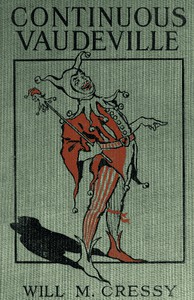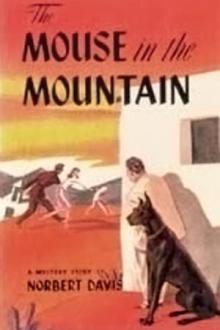Continuous Vaudeville, Will M. Cressy [top 10 inspirational books TXT] 📗

- Author: Will M. Cressy
Book online «Continuous Vaudeville, Will M. Cressy [top 10 inspirational books TXT] 📗». Author Will M. Cressy
Charlie Smith, of Smith & Campbell, in his younger days used to drive a delivery wagon for his father's fish market. But tiring of the fish business he started out to be "a Acter." At the end of five years he had reached a point where the team commanded (and sometimes got) a salary of eighty dollars a week. As driver of the fish wagon he had received eight. And he determined to go home and "show them." Dressing[23] the part properly for his "grand entre" put a fearful dent in his "roll"; so much so that he had to change what remained into one and two dollar bills in order to "make a flash."
But when he struck the old home town he was "a lily of the valley"; he had a Prince Albert coat, a silk hat, patent-leather shoes, an almost-gold watch and chain, a pretty-near diamond stud and ring and the roll of ones and twos, with a twenty on the outside.
After supper, sitting around the fire, he started in telling them what a success he was; he told them of all the big theaters he had appeared in; how good the newspapers said he was; what a large salary he received, etc., etc.
All seemed highly impressed; all except Father; finally, after a couple of hours of it, he could contain himself no longer, and burst out—
"Say, when are you going to stop this dumb fool business and come back and go to driving that wagon again?"
Ed Grey, "the Tall Story Teller," went from a small country town on to the stage. It was ten years before he ever came back to play the home town. When he did the whole town turned out[24] en masse; the Grey family ditto; after the show the family was seated around the dining-room table, talking it over. Mother sat beside her big boy, proud and happy. The others were discussing the show.
"That Mister Brown was awful good."
"Oh, but I liked that Blink & Blunk the best."
"That Miss Smith was awful sweet."
But not a word did any one have to say about "Eddie." Finally he burst out—
"Well, how was I?"
There was an ominous pause, and then Mother, reaching over and patting his knee lovingly, said,
"Now, don't you care, Eddie, as long as you get your money."
Cliff Gordon's father doesn't believe it yet. Cliff was playing in New York and stopping at home.
"Vere you go next veek, Morris?" asked Father.
"Orpheum, Brooklyn," replied Cliff.
"How mooch vages do you get dere?"
"Three fifty."
"Tree huntret unt fifty tollars?"
"Uh huh."
[25]Father nodded his head, sighed deeply, thought a minute, then—
"Then vere do you go?"
"Alhambra, New York."
"How mooch?"
"Three fifty."
"Then vere?"
"Keith's, Philadelphia."
"How mooch you get ofer dere?"
"Just the same; three fifty."
Father sighed again, thought deeply for a few minutes, then, with another sigh, said, half to himself,
"Dey can't all be crazy."
Tim McMahon (McMahon & Chapelle) had a mother who did not believe theaters were proper and Tim had a hard time getting her to come to see him at all. But finally she came to see her "Timmite" act. It was a big show, ten acts, and Tim was on number nine. After the show was over Tim went around in front of the house to meet her; she came out so indignant she could hardly speak.
"Why, what's the matter? Wasn't I good?" asked Tim.
[26]"Yis, sor, you was; you was as good as iny of them; you was better than any of thim; and they had no right to let thim other eight acts on foreninst ye: You ought to have come on first, Timmie."
The first time Josephine Sabel's father and mother saw her on the stage she was in the chorus of a comic opera company and was wearing tights. Mother ran out of the theater and Father tried to climb up over the footlights to get at Josephine and got put out.
Charlie Case had been on the stage for years before he ever got a chance to play his home town; then he came in with a minstrel show; he had a special lithograph, showing him standing beside an Incubator, which was hatching out new jokes every minute.
The house was crowded and Charlie was even more nervous than usual. Everybody else in the show got big receptions; Charlie walked out to absolute silence. He talked five minutes to just as absolute silence; then, discouraged, he stopped to take a breath; the instant he stopped the house was in a pandemonium; they really thought he was[27] great, but hadn't wanted to interrupt him. After that he would tell a joke and then wait; he was a knockout.
Later he was talking it over at home:
"Why, that awful silence had me rattled," he said; "I couldn't even remember my act; I left out a lot of it."
"Yes," said his father; "we noticed you forgot to bring on your Incubator."
[28]
UNION LABORA Song and Dance Team (recently graduated from a Salt Lake City picture house) got eight weeks booking on the Cort Circuit out through the Northwest. The first show told the story. They were bad: awfully bad. But they had an ironclad, pay-or-play contract and as the management couldn't fire them, it was determined to freeze them out. The manager started in giving them two, three and four hundred mile jumps every week, hoping that they would quit. But no matter how long or crooked he made the jumps they always showed up bright and smiling every Monday morning.
Finally they came to their last stand: and it happened that the manager, who had booked them originally, was there and saw them again. He could hardly believe his eyes, for, owing to the fact that they had been doing from six to sixteen shows a day for the past eight weeks, they now[29] had a pretty good act. As they were getting about as near nothing a week as anybody could get and not owe money to the manager, he wanted to keep them along. He was fearful the memories of those jumps he had been giving them would queer the deal, but he determined to see what a little pleasant talk would do; so he went to them and said,
"Now, boys, you have got that act into pretty good shape; and if you like I can give you some more time. And," he hastened to add, "you won't get any more of those big jumps either. I was awful sorry about those big fares you have had to pay."
"Oh, that's all right," replied one of the boys; "we belong to the Brotherhood of Locomotive Engineers and always ride on the engine free anyway."
[30]
MARTIN LEHMAN GOES TO NEW YORKMartin Lehman is the manager of the Orpheum Theater in Kansas City. Martin Beck is the general manager of the Orpheum Circuit. Mr. Beck had wired Lehman to come to New York at once. What Mr. Beck said went. So Lehman went.
If there is any one thing on earth that Martin Lehman loves better than another it is not traveling. He is probably the only man on earth who can get seasick anywhere and everywhere. A sprinkling cart will give him symptoms. His son Lawrence says that he always has to stand by and hold his father's hand when he takes a bath. He always walks to and from the theater because the street car might pass through a mud puddle and he would get seasick. The next worst thing in the world is a railroad train. He dies twice a mile regularly. But—Martin Beck said, "Come at once."
[31]So, with his suit-case full of Green River, Hermitage and other well-known mineral waters, a couple of lemons (who had been playing for Louis Shouse at Convention Hall the previous week), and his Orpheum pass, poor Lehman boarded the night train for Chicago, hoping for the best but expecting the worst—and getting it.
He got on board early so he could get into his berth before the train started. Lower seven, right in the middle of the car. He placed his bottles of life preservers in the little hammock beside him, punched a little hole in the end of one of the lemons, closed his eyes and said his evening prayer.
The train started. So did his troubles. The train gained headway. Ditto the trouble. But, like his forefathers in far-away Prussia, he fought for freedom. He brought all the strength of his powerful mind to bear. He tried "The New Thought," "Self-Hypnotism," "Silent Prayer"; he tried every religious belief he could think of except Mormonism. And finally he slept; or died; he was not sure which; and he didn't mind; he lost consciousness; that was all he cared for.
The next thing he knew somebody was shaking him and telling him to "Change cars!" It seemed that this car had developed a hot box and[32] passengers would have to change to the car ahead, taking the same numbered berth in the new car that they had occupied in the first one.
Poor Lehman's getting up and dressing was absolute proof of the power of mind over matter. But finally, with part of his clothing on his back and the rest over his arm, he managed to stagger into the other car, only to discover that he had lost his berth ticket.
The conductor said that the only thing to do was to wait until the other passengers got located, and the berth that was left would naturally be his. It doesn't take a mind reader to see what he got. Upper number one; right over the wheels: just beside a smoky kerosene lamp.
As in all good novels we will now have a line of stars.
* * * * * * *
Arriving in Chicago, he varied the misery of the trip by a taxicab trip across the city to catch the New York train: this time drawing lower nine.
"Troubles never come single." In the seat back of him was a woman with a baby. The lady in front of him indulged in perfume of a most violent type. The weather and the porter were warm and humid.
[33]He went up into the smoking room, but some rude drummers were smoking in there so he had to come back to his seat. The lady in front of him said something about people "reeking with tobacco smoke," and took another perfume shower-bath. Then the porter leaned over him to open the window.
So the day passed, and the night came; and Lehman went to bed. About two o'clock in the morning the end of the world came. Or so Lehman thought for a moment. It was afterwards discovered that the car he was on had broken a wheel and jumped the track. Upon coming to and taking account of stock, Lehman found that his injuries consisted of one fractured bottle, a dislocated vocabulary and a severe loss of temper.
For the second time on this awful trip he was invited to "change to the car ahead." The first thing he did was to hunt through his clothes for his ticket. No more of that upper number one business for your Uncle Martin! No sir! Having at last found it, he placed it in his mouth, picked up what there was left of his clothes and made his way up ahead to the other car.
"Tickets!" said the conductor.
"You bet!" said Lehman, taking the ticket[34] from his mouth and handing it to the conductor.
The conductor took it, copied the number on to his plan, handed the ticket to the porter and the porter took him in and put him to bed again.
Lehman tried to say his evening prayer again, but couldn't remember it. While he was thinking it over the door at the ladies' end of the car opened and something came down the aisle. As this "something" came out of the ladies' apartment, it was presumably a woman. But Lehman disputes that fact to this day. She was about six feet long, nine inches wide, all the way, and about the color of a cowhide trunk. Her hair was in curl papers, her teeth in her pocket and her trust in Heaven. Like a grenadier she marched down the aisle until she





Comments (0)